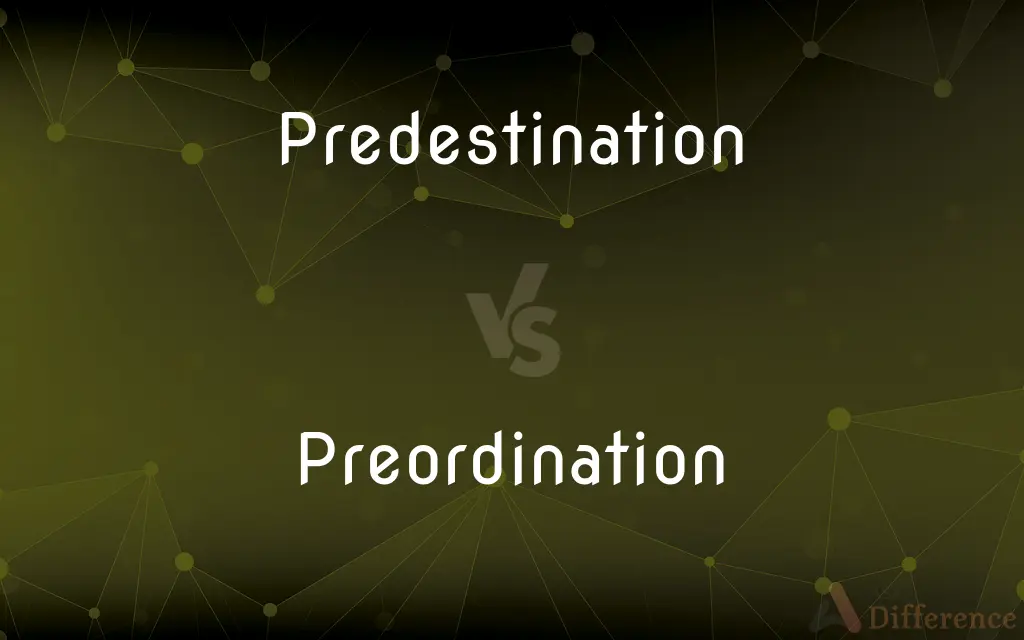Predestination vs. Preordination — What's the Difference?
Edited by Tayyaba Rehman — By Urooj Arif — Updated on April 3, 2024
Predestination refers to the divine foreordaining of all events and outcomes, including salvation, while preordination broadly means the act of determining something in advance, not limited to religious contexts.

Difference Between Predestination and Preordination
Table of Contents
ADVERTISEMENT
Key Differences
Predestination is a theological concept, particularly in Christianity, which suggests that God has foreordained everything that happens, especially regarding the salvation or damnation of souls. It implies a divine plan where the fate of each individual is predetermined. Preordination, while similar in suggesting a predetermined course, is a broader term that can apply to any predetermined event or outcome, not necessarily within a religious or divine context.
The doctrine of predestination is closely associated with Calvinist and Reformed theological traditions, emphasizing God's sovereignty and the predetermined election of those who will be saved. Preordination, on the other hand, can be used in various contexts, including secular ones, to indicate any scenario where outcomes are determined in advance, whether by divine will, human decision, or other means.
Predestination often involves complex theological debates about free will, divine justice, and mercy, focusing on the extent to which human actions are free or determined by God's will. In contrast, preordination may not carry the same depth of theological implications and can refer to simpler, more straightforward determinations made in advance, without delving into philosophical or theological discussions on free will.
The concept of predestination raises questions about the nature of God's omniscience and omnipotence, and how these attributes interact with human freedom and responsibility. Preordination, however, is a more neutral term that doesn't inherently raise questions about divine attributes or human freedom, but rather indicates a prior determination of events or outcomes.
Both concepts imply a forward-looking determination, but predestination is specifically concerned with the eternal destinies of souls and the divine plan, rooted deeply in religious belief systems. Preordination could refer to any plan or decision made in advance, including but not restricted to divine or religious contexts, making it applicable in a wider range of discussions.
ADVERTISEMENT
Comparison Chart
Definition
The divine determination of all events, especially salvation
The act of determining something in advance, not limited to divine context
Context
Primarily religious, specifically within Christianity
Broad, including both religious and secular contexts
Focus
Eternal destiny of souls, salvation, and damnation
Any predetermined event or outcome
Associated with
Calvinism, Reformed traditions
Used broadly without specific theological association
Theological Debate
Involves discussions on free will, divine justice
Can be applied without invoking deep theological or philosophical debate
Implication
Suggests a divine plan with specific outcomes for individuals
Indicates a prior determination without specifying the nature or scope
Usage
More specific to the doctrine of divine foreordination
More general, can refer to any predetermined plan or decision
Compare with Definitions
Predestination
Predestination is the belief that all events are predetermined by God, especially regarding human salvation.
The preacher's sermon on predestination sparked a debate on free will.
Preordination
It can apply to a wide range of predetermined plans or outcomes.
The company's success was attributed to the careful preordination of its business model.
Predestination
Predestination raises questions about the compatibility of divine foreknowledge and human free will.
Philosophers have long debated whether predestination negates the concept of free will.
Preordination
Preordination refers to the act of determining or ordaining something in advance, with or without religious connotation.
The strategy meeting involved the preordination of each step of the campaign.
Predestination
Predestination involves the predetermined election of those who will be saved.
He studied the theological implications of predestination on personal faith.
Preordination
Preordination can be used in contexts involving human decision-making.
The general's preordination of battle strategies was crucial for victory.
Predestination
It suggests a divine blueprint for the world and its inhabitants.
In Calvinism, predestination is central to understanding God's sovereignty.
Preordination
Unlike predestination, preordination does not necessarily involve divine will.
The board's preordination of leadership roles ensured a smooth transition.
Predestination
This doctrine is key in certain Christian denominations, underscoring the belief in an omnipotent, omniscient God.
The doctrine of predestination differentiates Reformed theology from other Christian perspectives.
Preordination
This term allows for a broader interpretation of predetermined events.
The novel explored themes of fate and the preordination of life's major events.
Predestination
Predestination, in Christian theology, is the doctrine that all events have been willed by God, usually with reference to the eventual fate of the individual soul. Explanations of predestination often seek to address the "paradox of free will", whereby God's omniscience seems incompatible with human free will.
Preordination
To appoint, decree, or ordain in advance; foreordain.
Predestination
The act of predestining or the condition of being predestined.
Preordination
The state or process of things being preordained.
Predestination
The doctrine that God has foreordained all things, especially that God has elected certain souls to eternal salvation.
Preordination
Before ordination.
Predestination
The divine decree foreordaining all souls to either salvation or damnation.
Preordination
The act of foreordaining: previous determination.
Predestination
The act of God foreordaining all things gone before and to come.
Preordination
(theology) being determined in advance; especially the doctrine (usually associated with Calvin) that God has foreordained every event throughout eternity (including the final salvation of mankind)
Predestination
Destiny; fate.
Predestination
(theology) The doctrine that everything has been foreordained by God or by fate.
Predestination
The doctrine that certain people have been elected for salvation, and sometimes also that others are destined for reprobation.
Predestination
Destiny or fate.
Predestination
The act of predestinating.
Predestination had overruled their will.
Predestination
The purpose of Good from eternity respecting all events; especially, the preordination of men to everlasting happiness or misery. See Calvinism.
Predestination
Previous determination as if by destiny or fate
Predestination
(theology) being determined in advance; especially the doctrine (usually associated with Calvin) that God has foreordained every event throughout eternity (including the final salvation of mankind)
Common Curiosities
Does predestination negate the concept of free will?
The relationship between predestination and free will is a complex theological issue, with various interpretations on how divine sovereignty coexists with human freedom.
What is preordination?
Preordination is the act of determining something in advance, which can apply to both religious and secular contexts without necessarily implying divine action.
In what contexts is preordination used?
Preordination can be used in a variety of contexts, including but not limited to strategic planning, leadership decisions, and narratives about fate, both in religious and secular discussions.
What implications does predestination have for the concept of divine justice?
Predestination raises questions about divine justice, particularly regarding the predetermined fate of individuals and how this aligns with concepts of mercy and fairness.
What is predestination?
Predestination is a doctrine suggesting that God has predetermined all events and outcomes, particularly concerning the salvation or damnation of souls.
Can preordination apply outside of religious contexts?
Yes, preordination can refer to any predetermined plan or decision, not limited to religious or divine contexts.
How are predestination and preordination different?
Predestination specifically refers to the divine determination of all events, particularly salvation, within a religious framework, while preordination is a broader term that can refer to any predetermined event or outcome, without being limited to divine or religious contexts.
How do Calvinism and Reformed traditions view predestination?
Calvinism and Reformed traditions hold predestination as a central tenet, emphasizing God's sovereign choice in the salvation of individuals.
How does predestination relate to free will?
Predestination involves theological debates on whether and how divine foreordination of events coexists with human free will.
Is predestination universally accepted in Christianity?
Predestination, particularly its interpretation concerning individual salvation, varies among Christian denominations and is a subject of theological debate.
Share Your Discovery

Previous Comparison
Fear vs. Dread
Next Comparison
Redesignable vs. RedesignAuthor Spotlight
Written by
Urooj ArifUrooj is a skilled content writer at Ask Difference, known for her exceptional ability to simplify complex topics into engaging and informative content. With a passion for research and a flair for clear, concise writing, she consistently delivers articles that resonate with our diverse audience.
Edited by
Tayyaba RehmanTayyaba Rehman is a distinguished writer, currently serving as a primary contributor to askdifference.com. As a researcher in semantics and etymology, Tayyaba's passion for the complexity of languages and their distinctions has found a perfect home on the platform. Tayyaba delves into the intricacies of language, distinguishing between commonly confused words and phrases, thereby providing clarity for readers worldwide.














































